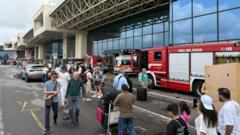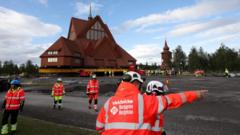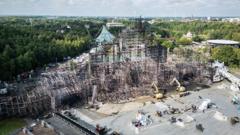The fire at an electrical substation near Heathrow caused major travel disruptions, demonstrating a stark contrast in energy resilience compared to nearby data centers, which are better equipped to handle power failures. Experts emphasize that airports must invest in backup systems to avoid such crises in the future.
Heathrow's Power Crisis Highlights Airport Infrastructure Vulnerabilities

Heathrow's Power Crisis Highlights Airport Infrastructure Vulnerabilities
A recent power outage at Heathrow Airport raises alarms about the aging infrastructure and the need for robust backup systems.
A fire at an electrical substation near Heathrow Airport on Friday resulted in significant power outages, forcing the airport to shut down for nearly 18 hours. This event highlighted the inadequacy of the backup systems in place at one of Europe's busiest airports, affecting global travel and revealing the frailties of Britain's critical infrastructure.
Interestingly, a modern data center located less than half a mile from the substation also experienced a power cut on the same day. However, users of the data center remained unaware of the outage, thanks to a reliable set of backup generators and battery systems that activated instantly. In contrast, it took Heathrow officials a staggering 18 hours to restore operations to its terminals and runways, leading to widespread travel delays.
According to energy experts, the disparity in recovery can primarily be attributed to financial considerations. Simon Gallagher, managing director at UK Networks Services, noted that the data center industry is relatively new and has prioritized resilience against power failures. Many of the world's airports, including Heathrow, have remained hesitant to make substantial investments necessary for comprehensive backup capabilities.
Even considering Heathrow's vast power consumption, comparable to that of a small city, engineering specialists argue that it is feasible to create dependable backup systems capable of sustaining normal operations during catastrophic power outages. Yet, implementing such systems could cost upwards of $100 million and take years to finalize. Airports generally lean towards cost-benefit analyses, leading them to believe that the required investments may not justify the potential risks.
Gallagher explains, “There seems to be an assumption that investing in backup systems would cost too much.” As a result, many airports have forgone this crucial upgrade, leaving them vulnerable to the type of disruptions witnessed last week. The Heathrow fire serves as a wake-up call for stakeholders in airport management to reconsider their approach towards energy resilience before facing the next unavoidable power crisis.




















